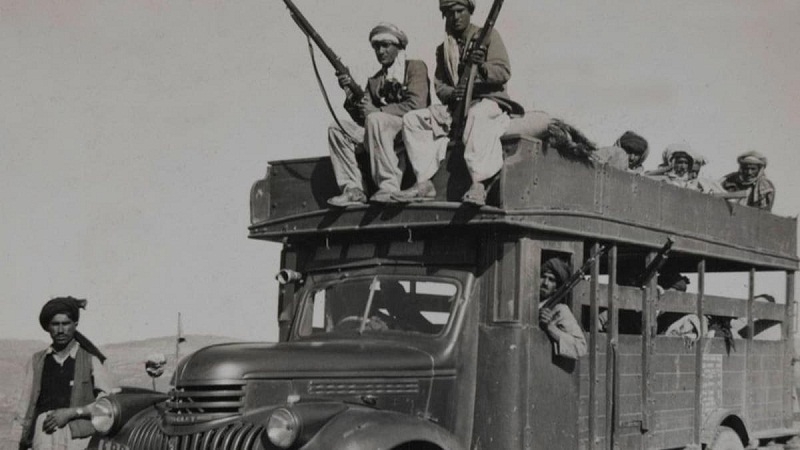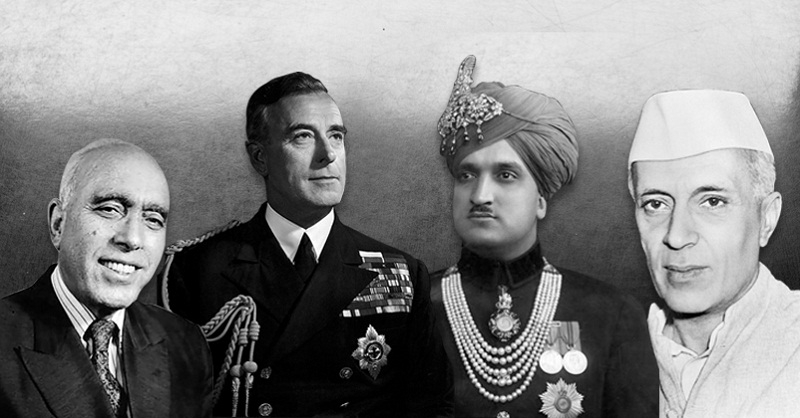PoK on India’s Radar? Why Not ? – III

The Kashmir Diary: On 21st October 1947, several thousand Pashtun tribesmen from the North-West Frontier Province (NWFP) supported by the Pakistan army infiltrated into Jammu and Kashmir in order to liberate it from the Maharaja’s rule.
Soldiers of Maharaja tried to avert this invasion but the pro-Pakistan rebellion was armed with modern armaments and gained control of almost the entire Poonch district on 24th October 1947.
The invaders captured the towns of Muzaffarabad and Baramulla and reached twenty miles near the northwest of the State's capital Srinagar.
Maharaja Hari Singh singed the “Instrument of Accession” and handed over three subjects i.e. control of defence, external affairs and communications to the Government of India.
Indian troops were immediately airlifted to Srinagar while Pakistan intervened subsequently and war started between the Indian and Pakistani armies with the two areas of control stabilized and the regions won by the Pakistan supported rebellions remained with Pakistan which is now called Pakistan occupied Kashmir (PoK).
In the southern part of Pakistan-occupied Kashmir, there are 8 districts, namely, Neelam, Mirpur, Bhimbar, Kotli, Muzaffarabad, Bagh, Rawalakot and Sudhanoti.
These three accessions of the Princely States in India viz., Kashmir, and Junnagadh created many constitutional issues and which had several political problems in the new India which raised international repercussions
 Sheikh Abdulla, Lord Mountbatten, Maharaja Hari Singh, and Jawaharlal Nehru
Sheikh Abdulla, Lord Mountbatten, Maharaja Hari Singh, and Jawaharlal Nehru
3rd June 1947: Lord Mountbatten proposed the partition plan to divide British India into independent dominions of India and Pakistan.
1st August 1947: Mahatma Gandhi visited the Maharaja and impressed upon him the need to be prompt in deciding on the State's accession based on the people's wishes. In discussions with Ram Chandra Kak, Gandhi pointed out Kak's lack of popularity among the people and Kak offered to resign.
20th September 1947: According to Sardar Ibrahim, a people's militia of 50,000 ex-servicemen had been raised to form an ‘Azad Army’.
29th September 1947: Sheikh Abdullah was released from prison. Henry Lawrence Scott, the Chief of Staff of the State Forces left his position. About 100,000 Muslims from East Punjab and an equal number of non-Muslims from West Punjab were safely escorted through Jammu by the State Forces.
30th September 1947: Nehru proposed using plebiscite as a means of settling disputes regarding princely states. It was discussed in the Indian Cabinet and then communicated to Pakistani Prime Minister Liaquat Ali Khan in Delhi. Khan's eyes were said to have “sparkled” at the proposal, though he made no response.
3rd October 1947: Khwaja Ghulam Nabi Gilkar, under the assumed name “Mr. Anwar”, issued the proclamation of a provisional ‘Azad Kashmir’ government in Muzaffarabad. This government failed with the arrest of Gilkar in Srinagar.
5th October 1947: Nehru is informed by Dwarakanath Kachru that the Maharaja had lost control of the western districts of the state.
6th October 1947: An armed rebellion begins in Poonch. The Maharaja replaces Chief of State Forces Banbury and Police Chief Powell with Hindu officers.
7th October 1947: The Maharaja imposed rigorous pre-censorship of the press, especially of all views regarding the State's accession
8th October 1947: Pakistani raids on the borders of Jammu and Kathua districts began.10 October 1947: Sardar Vallabhbhai Patel expedited Justice Mahajan's leave from Punjab High Court, which enabled him to accept the Prime Ministership. Mahajan visited Indian leaders and Lord Mountbatten in Delhi before he proceeded to Srinagar.
9th October 1947: The Owen Pattan post on Jhelum River was captured by rebels. Sehnsa and Throchi were abandoned by State Forces after attack.
12th October 1947: K. H. Khurshid, Jinnah's private secretary, was sent to Kashmir to mobilize support for Pakistan, and reported: "Muslim Conference is now practically a dead organization." He advocated Pakistan to use force, and "supply arms and foodstuff to the tribes within and without the state.”
14th October 1947: Some activists of the Rashtriya Swayamsevak Sangh (RSS) and the Akalis in retaliation mounted attacks on villages of the Jammu district, which killed Muslims and set houses on fire, stated to be the beginning of the 1947 Jammu violence.
17th October 1947: Brigadier N.S. Rawat given the charge of the Jammu Brigade of the State Forces, and Brigadier Khuda Baksh made Chief of Staff, second in command.
21st October 1947: Pakistan precipitated the first Indo-Pakistani War when it launched a tribal lashkar (levy) from Waziristan to overthrow the Maharaja's government. Thousands of Pashtuns from Pakistan's North West Frontier Province (NWFP) recruited covertly by the Pakistani Army, invaded Kashmir along with the Poonch rebels, allegedly incensed by atrocities against fellow Muslims in Poonch and Jammu. The tribesmen engaged in looting and killing along the way. Pro-Pakistan members of the Maharaja's army rebelled at Domel (Muzaffarabad) and took control of the Jhelum river bridge.
22nd October 1947: All the Muslim members of the State Police in Jammu City were disarmed and ordered to go to Pakistan.
24th October 1947: New Delhi received the news of tribal invasion via two channels, from General Gracey of Pakistan Army communicated to General Lockhart and from R. L. Batra, the Deputy Prime Minister of Jammu and Kashmir, to Nehru. Batra carried a message from the Maharaja which requested military assistance and proposed accession to India.
24th October 1947: A second provisional government of Azad Kashmir was established at Palandri under the leadership of Sardar Ibrahim.
24th October 1947: Bhimber fell to rebels after an attack by armoured vehicles of the Pakistan Army.
26th October 1947: The Maharaja signed the Instrument of Accession (IoA), acceding the state to the Indian Union. India accepted the accession, regarding it provisional until such time as the will of the people could be ascertained.
27th October 1947: The Indian Army entered the state to repel the invaders. Sheikh Abdullah endorsed the accession but termed it ad hoc and to be ultimately decided by the people of Jammu and Kashmir. He was appointed head of the emergency administration.
1st November 1947: Lord Mountbatten and Mohammad Ali Jinnah met in Lahore, as the Governor Generals of India and Pakistan. Mountbatten offered India's proposal that the accession of Junagadh, Hyderabad and Kashmir should be decided by an impartial reference to the will of the people in the form of a plebiscite. Jinnah rejected the offer. Sheikh Abdullah recommended that India give an ultimatum and declare war against Pakistan upon the expiry of the ultimatum. Nehru did not favor a broader war.
3rd November 1947: Tribesmen broke through to within 5 miles (8.0 km) of the Srinagar airport and were beaten back. Indians suffered heavy casualties. Indian Home Minister Sardar Vallabhbhai Patel argued for the army to be reinforced; two more battalions were air-lifted, and a squadron of armored cars and field artillery were dispatched from Pathankot.
7th November 1947: Rajouri was captured by Azad rebels. 30,000 Hindus and Sikhs gathered there were killed in the 1947 Rajouri Massacre before it was relieved, with the exception of 1,500 who escaped to the hills.
25th November 1947: Mirpur fell to the rebels. 20,000 Hindus and Sikhs taking shelter at the town were killed in the 1947 Mirpur Massacre during the rebel occupation. The day is remembered as the “Mirpur day” in Indian-administered Jammu.
26th November 1947: During Pak PM Liaquat Ali Khan's visit to Delhi for a Joint Defence Council meeting, the two countries reached an agreement on the sharing of sterling balances. A tentative agreement on Kashmir was reached; Pakistan agreed to use its influence on the raiders to withdraw, India to scale back its troops, and the UN to be approached for holding a plebiscite. However, the agreement was vetoed by Jinnah: “No commitments should be made without my approval of terms of settlement. Mr. Liaquat has agreed and promised to abide by this understanding,” read his note to the ministers. The next day, India's Defence Committee was informed that Pakistan was reinforcing the tribesmen.
4th December 1947: The British Commander-in-Chief of the Pakistan Army sanctioned military involvement in the Kashmir War. One million rounds of ammunition and twelve volunteer officers were provided.
8th December 1947: A meeting between Nehru and Liaquat Ali Khan, along with ministers and Lord Mountbatten, was deadlocked. Mountbatten proposed that the UN be invited to break the deadlock.
15th December 1947: Indian forces lost ground and Nehru contemplated escalating the war across the international border to strike against the raider's bases, but decides against it.
20th December 1947: Mountbatten recommended India take the matter to the UN, where he says it would have a “cast-iron case”. He believed the UN would promptly direct Pakistan to withdraw. The proposal was discussed in the Indian Cabinet.
28th December 1947 – 30th December 1947: Mountbatten urged Nehru “to stop the fighting and to stop it as soon as possible”. Exchanges between Mountbatten and Nehru were passed on to the British government, which was advised that any Indian defeat in the Kashmir Valley would immediately lead to a broader war. British Prime Minister Attlee warned Nehru that opening a broader war would jeopardize India’s case in the UN. Britain alerted the US, which requested clarifications from the Indian government.
31st December 1947: India referred the Kashmir problem to the UN Security Council.
31st December 1947: The British Commonwealth Relations Office (CRO) asked its permanent representative at the UN, Alexander Cadogan, about the validity of Indian claims. Cadogan responded that India was entitled to charge Pakistan as an aggressor under Article 35 and to take measures for self-defence under Article 51, including "pursuing invaders into Pakistan". (To be continued)
